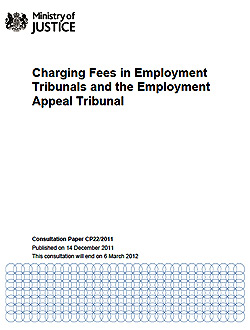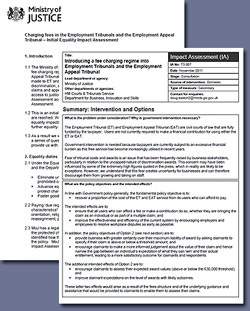 |
||||||||||||||||||||||||||||||||||||||||||||||||||||
 |
||||||||||||||||||||||||||||||||||||||||||||||||||||
|
Prohibitive Employment Tribunal Charges Heralds Increase In Victimisation By Employers The Justice ministry today (14th December) announced a consultation document on the proposed fees to be introduced next year that those wishing to take their employer to an employment tribunal, will have to pay a fee. This will affect those workers who refuse to follow instructions from the employer on health and safety grounds and lay them open to being sacked unfairly, without the ability to seek recompense from the employer, which currently may be in the form of money and/or reinstatement. Along with it the stress and subsequent ill health suffered by many who are dismissed (not 'let go') from their jobs unfairly.
“Government intervention is needed because taxpayers are currently subject to an excessive financial burden as this free service has become increasingly utilised in recent years.” No mention of why and of that fact that employers continues to walk all over the rights of their employees. But more poignant is this statement: The governments press release today, does not make for insurance for those on poor wages simply because this government's idea of a low wage differs from issue to issue: Seeking to appear reasonable in publishing the consultation, justice minister Jonathan Djanogly said: 'Currently, the UK taxpayer bears the entire £84m cost per year of resolving other people’s employment disputes at tribunals. This is not sustainable. 'We believe that people should pay a fair amount towards the cost of their case. Fee waivers will be available for people on low incomes to protect access to justice. 'Our proposed fees will encourage businesses and workers to settle problems earlier, through non-tribunal routes like conciliation or mediation and we want to give businesses – particularly small businesses - the confidence to create new jobs without fear of being dragged into unnecessary actions'. The introduction to the consultation document makes it clear that charging for the bringing of employment tribunals claim against the employer WILL be introduced as soon as possible. It also makes it obvious that Option 1 is preferred as this allows for charges to be introduced in 2013. The main proposals of Option 1 are: That fees will be initially set to recover a proportion of the cost of providing the service; That for single claims the level of fees should vary depending on the nature of the claim made (reflecting the likely level of resources used by claims of this nature) and the stage reached in the proceedings; That for multiple claims the level of fees should vary depending on the nature of the claim made (reflecting the likely level of resources used by claims of this nature), the stage reached in the proceedings and the number of people in the claim * That there should be two main charging points for fees – first, on issue and, for those claims proceeding to hearing, before the hearing. * That fees will be initially payable at the time of lodging the claim by the party who makes the claim to an employment tribunal or an appeal with the Employment Appeal Tribunal. * That the party that lodges a claim with an employment tribunal or an appeal with the Employment Appeal Tribunal should initially pay the hearing fee in advance of the claim or appeal being heard; * That the indicative fee levels for single claims to employment tribunals are proposed at the following rates:
* That there are 6 further fees for certain specified applications that may be made after a claim has been accepted, and the indicative fee levels are proposed at:
* That the HM Courts & Tribunals Service remission system will be available for those who need to access the tribunals but cannot afford to pay the fee; and * That tribunals have power to order that the unsuccessful party reimburse the fees paid by the successful party so that the cost is ultimately borne by the party who caused the system to be used.
The main proposals under Option 2 in this consultation paper are set out below with the main differences from Option 1 highlighted in bold: * That there should be one main charging point for fees only, at issue of claim stage, and in employment tribunals six further fees for certain specified applications that may be made after a claim has been accepted; * That the Level of fees should vary depending on the nature of the claim made (reflecting the likely level of resources used by claims of this nature) and the value of the claim, and for multiple claims, the number of people in the claim. * That if the claimant chooses to seek an award over the threshold of * That where a claimant seeks an award lower than the threshold of * That the fee for high value claims (Level 4) will be initially set to recover the full cost of providing the service with other fees (Levels 1, 2 and 3) set below full cost recovery; * The indicative fee levels for single claims in Option 2 are proposed at:
* That fees will be initially payable at the time of lodging a claim by the party who makes the claim to an employment tribunal or an appeal with the Employment Appeal Tribunal; * That the HM Courts & Tribunals Service remission system will be available for those who need to access the system but cannot afford to pay the fee; * That tribunals have power to order that the unsuccessful party reimburse the fees paid by the successful party so that the cost is ultimately borne by the party who caused the system to be used. It should be noted that Option 2 relates only to the employment tribunals and that only one proposal (described at Part 3) is made in relation to the Employment Appeal Tribunal. The danger, and no doubt the intended outcome, is that these swinging costs will result in very few tribunal cases, resulting in a free for all environment for employers to victimise employees, hire and fire at will, and to discriminate on grounds of sex, disability; all the while ignoring any HR procedures they may have in place. Without the deterrent of a costly employment tribunal, there will be huge number of workers made ill and financially as a result of being sacked unfairly. Many believe that when charges are introduced, they will remain forever as it is highly unlikely that any future government would remove the charges, in case they are accused of encouraging employees to take their employer to a tribunal. Furthermore, charges will no doubt keep increasing if the Government does not see reductions in tribunals at a level that they wish i.e. none! Taken together with the changes to legal aid, and the proposed decimation of both employment law and health & safety law, those seeing this as an all out war against the working people of this country and the poor and helpless in our society; can be easily forgiven if not applauded for their understanding of what really is happening here. You can download the consultation document and accompanying documents including the consultation questionnaire, from the E-Library by using keyword 'tribunal' Read the Ministry of Justice press release here Source: Ministry of Justice
|
||||||||||||||||||||||||||||||||||||||||||||||||||||
|
|
||||||||||||||||||||||||||||||||||||||||||||||||||||


